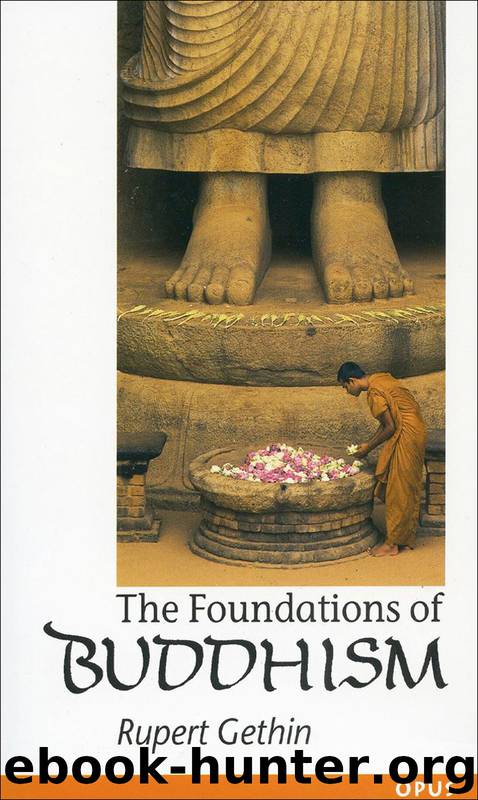The Foundations of Buddhism by Gethin Rupert

Author:Gethin, Rupert
Language: eng
Format: epub
Publisher: OUP Oxford
Published: 1998-03-16T16:00:00+00:00
The role of faith
While the noble eightfold path may be understood as strictly relevant only to the practice of the ‘noble ones’, nevertheless its basic structure can still be seen as revealing something general about the nature of the spiritual path: the basic dependence of one’s actions (items 3–5) upon one’s beliefs and aspirations (items 1–2), and, in turn, of one’s basic emotional state (items 6–8) upon one’s actions. In fact here is a certain parallelism between the structure of the eightfold path and the chain of dependent arising, where ignorance conditions certain actions which in turn condition one’s rebirth. The parallelism is clearer when, as often in the early texts, we find talk of wrong view, wrong intention, wrong speech, wrong action, wrong livelihood, wrong endeavour, wrong mindfulness, wrong concentration. Moreover, as the positive sequence of dependent arising begins with faith (śraddhā/saddhā), so the sequence of the eightfold path begins with right view (samyag-dṛṣṭi/sammā-diṭṭhi). Without some initial trust in the fact that there is a way out of suffering, without some seed of understanding of the nature of suffering and its cessation, we would never begin to look for the path and we would have no hope of finding it.
An ancient formula describes the beginning of the path in the following terms:
A Tathāgata appears in the world … He teaches the Dharma that is beautiful in the beginning, beautiful in the middle, and beautiful in the end. A householder or a householder’s son or someone born into some family hears that Dharma. And hearing the Dharma, he gains faith in the Tathāgata.2
Faith or confidence in the Buddha, his teaching (dharma/dhamma) and the community (saṅgha) of those who have followed and realized the teaching is the starting point of the Buddhist path that is assumed both by the earliest texts and by those brought up in traditional Buddhist cultures today. Yet those of us whose sensibilities have been moulded by more recent Western intellectual traditions are often uncomfortable in the presence of religious faith and its devotional and ritual expression. Indeed nineteenth- and early twentieth-century enthusiasts have on occasion presented Buddhism as the answer to the modern world’s ‘crisis of faith’: a religion devoid of belief in God and the saving power of rituals, whose truths are not accepted on the authority of scripture, but verified by direct experience.
Certainly the Buddha counsels the Kālāmas not to reject or accept things because tradition, scripture, reasoning, logic, or argument tells them to do so, nor out of respect for some ascetic, but rather because of their own direct knowledge.3 Yet a preoccupation with the Kālāma Sutta as a repudiation of faith betrays a misunderstanding of the very nature of faith and its devotional and ritual expression in Buddhism. As the Buddhist scholar Edward Conze has commented:
This sceptical age dwells anyway far too much on the intellectual side of faith. Śraddhā, the word we render as ‘faith’, is etymologically akin to Latin cor, ‘the heart’, and faith is much more a matter of the heart than the intellect.
Download
This site does not store any files on its server. We only index and link to content provided by other sites. Please contact the content providers to delete copyright contents if any and email us, we'll remove relevant links or contents immediately.
The Way of Zen by Alan W. Watts(6617)
Ego Is the Enemy by Ryan Holiday(5452)
The Art of Happiness by The Dalai Lama(4131)
The Book of Joy by Dalai Lama(3988)
Why Buddhism is True by Robert Wright(3454)
Spark Joy by Marie Kondo(3304)
Shift into Freedom by Loch Kelly(3199)
Happiness by Matthieu Ricard(3050)
A Monk's Guide to a Clean House and Mind by Shoukei Matsumoto(2916)
The Lost Art of Good Conversation by Sakyong Mipham(2654)
The Meaning of the Library by unknow(2573)
The Unfettered Mind: Writings from a Zen Master to a Master Swordsman by Takuan Soho(2311)
The Third Eye by T. Lobsang Rampa(2269)
Anthology by T J(2215)
Red Shambhala by Andrei Znamenski(2204)
The Diamond Cutter by Geshe Michael Roach(2062)
Thoughts Without A Thinker: Psychotherapy from a Buddhist Perspective by Epstein Mark(2028)
Twilight of Idols and Anti-Christ by Friedrich Nietzsche(1895)
Advice Not Given by Mark Epstein(1881)
